Mission: Impact podcast & blog
Build a better world without becoming a martyr to your nonprofit cause
Listen on:
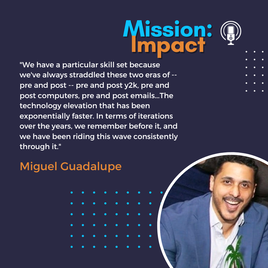 In episode 89 of Mission: Impact, Carol Hamilton and Miguel Guadalupe discuss issues of generational engagement in leadership, highlighting the frequent oversight of Generation X and stressing the unique adaptability and valuable perspective that this generation brings to the table. Miguel emphasizes the necessity for Generation X to advocate for recognition in leadership roles, reflecting on a LinkedIn post that sparked a broader conversation about the career stagnation felt by many in his generation. Episode highlights: Don’t Forget GenX: underrepresentation and unique contributions of Generation X in leadership and decision-making processes. Adapting to change: how Generation X's experience with the evolution of technology equips and other big changes over their career equips them with adaptability, a valuable skill set for leadership. Perpetual Utility player: Many of the Gen Xers who commented on Miguel’s LinkedIn post shared the feeling of being overlooked in their professional lives. Visibility and Advocacy: Miguel suggests that Generation X should take a lesson from Millenials and Gen Z and take a more assertive stance in advocating for their visibility and leadership opportunities. Guest Bio:
Miguel Guadalupe is Vice President of Donor and Community Relations at The Bowery Residents' Committee, or BRC in NYC. BRC helps over 10,000 individuals a year suffering from homelessness, mental illness, and addiction with the dignity and compassion they deserve. Miguel manages donor engagement, fundraising, and event planning, as well on service as BRC liaison to local elected officials, community organizations and businesses wherever a BRC program is located. He is also Vice Chair of the National Puerto Rican Day Parade, and helps to produce America's largest cultural celebration, in NYC, while helping to raise and distribute over $200K annually to students attending higher education. Important Links and Resources: Miguel’s viral LinkedIn post: https://www.linkedin.com/feed/update/urn:li:activity:7036817928465350656?updateEntityUrn=urn%3Ali%3Afs_feedUpdate%3A%28V2%2Curn%3Ali%3Aactivity%3A7036817928465350656%29 Miguel Guadalupe on LinkedIn: https://www.linkedin.com/in/miguelguadalupe/ The Bowery Residents' Committee https://www.brc.org/ Click "Read More" for Transcript 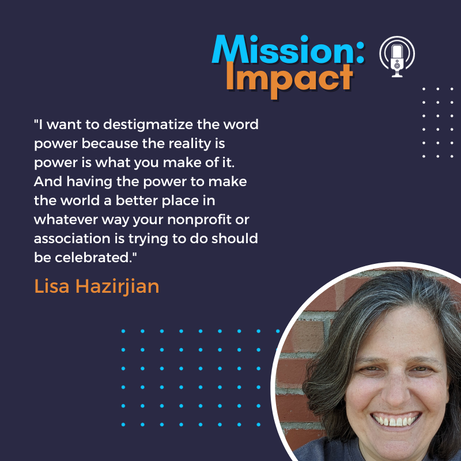 In episode 88, Carol Hamilton interviews Lisa Hazirjian, a historian turned advocate, as they delve into Lisa’s unexpected journey from academia to the forefront of nonprofit advocacy. Through a candid recount of personal challenges and professional transitions, Lisa shares her story, motivations, and the lessons she’s learned along the way. Some of the conversation’s highlights: Motivation for Advocacy: Personal emotions during times of loss and the desire to effect change in public policy were Lisa’s primary motivators to engage in advocacy work. Nonprofit Misconceptions: Lisa corrects the common misconception that nonprofits cannot engage in policy advocacy, stressing that they can and should, as they often hold valuable expertise that can inform policymaking.
Strategic Advocacy: Despite political power dynamics, Lisa argues that effective advocacy is less about which party is in power and more about the ability to influence decision-makers through strategic engagement and communication. Building Relationships: The importance of building relationships before needing to make an ask is highlighted, with suggestions to conduct surveys and use supporters as effective messengers to lawmakers. Volunteer Engagement: Discussion of a “ladder of engagement” approach to progressively involve volunteers in advocacy work, starting with simple actions and building up to higher responsibilities. Training and Responsibility: Emphasizing the need to train volunteers not just for tasks but also for understanding the bigger picture, the narrative includes a personal story demonstrating this practice. Small Wins and Community: Acknowledging small victories and the value of creating a sense of community among advocates is presented as crucial for maintaining motivation and momentum in long-term policy campaigns. For the transcript and more information click here: 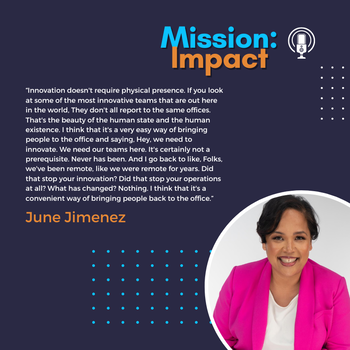 In episode 87 of Mission: Impact, Carol Hamilton and June Jimenez discuss:
00:20:30: Decision-making driven by prior investments in physical office spaces
00:21:00 The myth of physical presence as a prerequisite for innovation and organizational culture 00:23:00:** Culture exists in both remote and co-located setups 00:24:30:** Younger employees challenges with integrating with organizational cultures 00:26:00:** Particular challenges for newer generations in navigating office culture remotely 00:28:30:** What leaders need to think about in terms of informal nature of information exchange in physical offices vs. remote settings. 00:29:30:** Strategies for helping new staff integrate, 00:33:30:** Training and development for managers successful adaptation to remote work Guest Bio: June Jimenez is an organizational development consultant to mission-focused organizations. June's work focuses on the people, systems, processes and technology needed to help organizations deliver their missions while experiencing tremendous change. June brings over 20 years of professional experience to each engagement gained through her work across the nonprofit, government and private sectors. June is a mother to a 10 year old rabble rouser, partner to a retired police and military professional and passionate about social justice. June received her Bachelor’s degree from Cornell University and received her Executive MBA from the University of North Carolina at Chapel Hill. Important Links and Resources: June Jimenez: https://www.linkedin.com/in/jimenezjune/ Register for the Nonprofit Leadership Roundtable (12/14/23 at 1:00pm eastern): https://www.eventbrite.com/e/760734085127?aff=oddtdtcreator Click "Read More" for interview transcript. 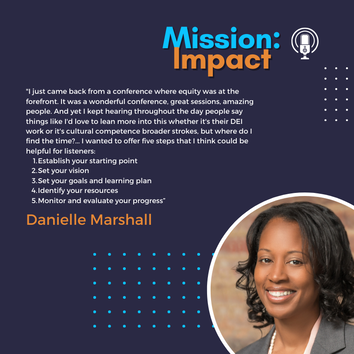 In episode 86 of Mission: Impact, Carol Hamilton joins with Danielle Marshall for another learning out loud episode where we do a deep dive into a topic. Today we focused on cultural competence or cultural humility and talked about ways for people to work on and enhance their cultural competence. Danielle defines cultural competence as the ability to navigate interactions effectively across diverse cultures, emphasizing the importance of valuing differences and recognizing that no social identity is a monolith. While it is easy to think that finding the time to improve your cultural competence is too hard, Danielle offers a practical five-step approach:
Highlights:
- [00:07:16] Definition of Cultural Competence; Cultural Competence/Cultural Humility - [00:17:16 Five Actionable Steps for Nonprofit Leaders in Building Cultural Competence - [00:23:16] Cultural competence learning plan - [00:33:16] Accountability partners and affinity groups - [00:39:16] Continuous learning journey Guest Bio: Danielle is an inclusive leader focused on strengthening collaboration among teams, leaders, and stakeholders to foster problem-solving, create solutions, and improve culture. She finds her inspiration in leading systemic change work that promotes equity and inclusion. Danielle founded Culture Principles in response to a persistent need to operationalize Racial Equity, Diversity, and Inclusion metrics, centering REDI goals and creating accountability systems. She supports clients through her Mapping Equity Framework focused on Unearthing Knowledge, Elevating Strategy, and Transforming Sustainability. She centers her work around organizational assessment, racial equity learning intensives, and the development of racial equity action plans. Understanding that each organization arrives at this work from different perspectives, she utilizes assessment in building a customized strategy for each unique partner. Previously Danielle served as a non-profit leader for 20+ years and today works on strategy development that enables nonprofits to achieve equitable mission-driven results. Danielle holds a Master's degree in Industrial-Organizational Psychology from Louisiana Tech University and draws on her background as an I/O psychologist in applying a racial equity lens to organizational policies, practices, and programs. She is a Certified Diversity Professional (CDP)/ Executive Coach (ACC). During her playtime, you can find Danielle traveling, knitting, and kayaking in all 50 states. Important Links and Resources:
Click "Read More" for Transcript 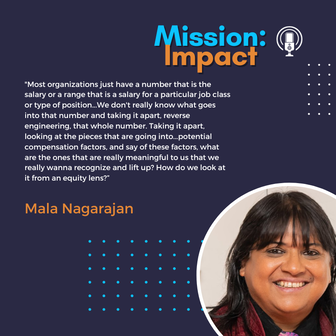 In episode 85 of Mission: Impact, Carol Hamilton and Mala Nagarajan discuss organizational development, compensation structures, and critical discussions within nonprofit organizations. They explore the limitations of market-based compensation, the concept of a thriving wage, and the importance of aligning organizational values with employee compensation. Mala emphasizes the need for transparent and comprehensive approaches to compensation, touching on various factors such as areas of responsibility, risk assessment, and the significance of understanding one's relationship with money. In addition they explore how to integrate compensating for the emotional labor required in a role. They discuss the complexities of legal considerations and highlight the need for organizations to reevaluate traditional practices to foster a more equitable and holistic work environment. Highlights:
02:27: Creating equitable compensation models for organizations 04:50: Principles underpinning the work 08:16: The importance of interdependence 13:08- Transparency in compensation 16:21 Emotional labor and compensation 26:00 - Recognizing individual strengths and aligning them with organizational roles beyond just financial incentives 32:00 - Biases and values embedded in market-based compensation structures 37:00 - Implementing a thriving wage, distinct from a living wage 45:00 - The "conditions for readiness" necessary for successful implementation 53:00 - Assessing risk tolerance Guest Bio: Mala Nagarajan is a senior HR consultant who works with nonprofit organizations rooted in racial and social justice values. She is driven by a vision of strong organizations working collaboratively toward a common purpose and approaches her HR work with a values-aligned, people-centered, and movement-oriented lens. Mala is a consultant with RoadMap, a national network of consultants who work with social justice organizations. She helped organize RoadMap’s HR/RJ (racial justice) working group. Mala has developed an innovative Compensation Equity Process and Calculator™ that reverse-engineers supremacy out and re-engineers equity in. It’s an evolving approach accompanied with a custom tool that organizations can use to shift from a market-based to an anti-racist compensation model that centers those living at the intersections of multiple marginalized communities. Important Links and Resources: Mala Nagarajan - https://www.linkedin.com/in/malanagarajan/ Vega Mala Consulting | www.vegamala.com Marilyn Waring TED talk on what the GDP misses -- https://www.tedxchristchurch.com/marilyn-waring Polarities: https://www.polaritypartnerships.com/ The MIT Living Wage Calculator: https://livingwage.mit.edu/ Hidden Brain episodes on budgets: https://hiddenbrain.org/podcast/money-2-0-why-we-bust-our-budgets/ Learn more about Mala’s compensation work here: Fund the People: Compensation Philosophy, NPQ-Compensation Equity: A Values-Based Framework & Implementation Guide, Top Tips to Stop Widening the Wealth Gap, Why Radical Human Resources is Critical for Movement Organizations, Equitable Compensation is a Risk Worth Taking, Brave Questions: Recalculating Pay Equity, Don't Put Metal in the Microwave and other Compensation Myths, Transforming the Workplace: HR Innovations, Pay Scale Equity Process and Calculator. HR resources: RoadMap Consulting: Human Resources and Justice: Addressing Racism and Sexism in the Workplace. Washington Nonprofits: Workers in Nonprofits. The Management Center: Making Compensation More Equitable. Click "Read More" for transcript |
Archives
May 2024

Grace Social Sector Consulting, LLC, owns the copyright in and to all content in and transcripts of the Mission: Impact podcast, as well as the Mission: Impact blog with all rights reserved, including right of publicity.
|
Telephone301-857-9335
|
info[at]gracesocialsector.com
|
Grace Social Sector Consulting, LLC, owns the copyright in and to all content in, including transcripts and audio of the Mission: Impact podcast and all content on this website, with all rights reserved, including right of publicity.
|